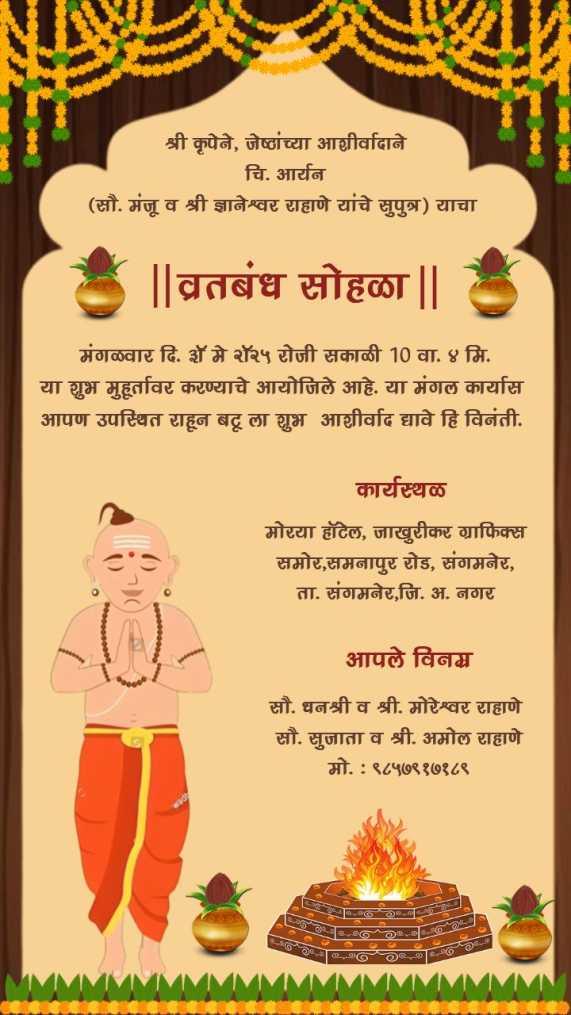Unique Munj Invitation Designs with Cultural Touch

The Munj ceremony, also known as Upanayan Sanskar, holds deep cultural and religious significance in Hindu tradition. It marks a boy’s transition into spiritual and educational life. As a celebration rich in rituals and heritage, the invitation card must reflect its profound importance. A munj invitation card design with a cultural touch is not just a formality; it is the first glimpse into the sacred event and should radiate elegance, tradition, and personalized aesthetics.
Why Choosing a Unique Munj Invitation Design Matters
A well-designed Munj invitation not only communicates event details but also conveys respect for tradition and guests. From scriptural illustrations to ethnic motifs, the design should reflect the values and customs of the family. In a world of digital and print options, it becomes essential to stand out with an aesthetic that resonates culturally and emotionally.
Elements of a Culturally-Rich Munj Invitation
1. Traditional Motifs and Artwork
Incorporating sacred symbols such as the Gayatri mantra, swastika, kalash, or peepal leaves adds authenticity to the invitation. Illustrations of a boy in traditional attire holding sacred threads or receiving blessings from a guru add a visual narrative to the design.
2. Sanskrit and Regional Language Usage
Using Sanskrit shlokas, Marathi couplets, or regionally significant quotes introduces a layer of cultural elegance. It honors the heritage while connecting with guests on a deeper, spiritual level.
3. Premium Paper and Eco-Friendly Materials
Opt for handmade textured papers, recycled kraft sheets, or banana fiber parchment to blend luxury with sustainability. Embossed golden text or silk-screen printing adds richness while maintaining an earthy, traditional charm.
4. Personalized Design Themes
Themes inspired by temple architecture, vedas, or Puranic legends can create a striking invitation. Whether it’s a folded card shaped like a scroll or a booklet-style format that narrates the significance of the Munj, personalizing the design adds unmatched character.
Digital Munj Invitations with a Cultural Aesthetic
1. Animated Video Invitations
Create a visually rich animated video that depicts the Munj rituals, accompanied by classical music like bhajans or flute tunes. These can be shared through WhatsApp, email, or social media, combining modern convenience with traditional storytelling.
2. Interactive E-invites
HTML-based invitations with embedded interactive elements like RSVP buttons, map integration, and clickable photo galleries offer a seamless guest experience. These can be adorned with Ganesha motifs, sacred chants, and animated rituals, preserving the cultural feel.
Top Trends in Munj Invitation Designs
1. Scroll Invitations (Patrika Style)
Inspired by royal traditions, scroll-style invitations exude grandeur. Printed on velvet, jute, or silk fabric, they are sealed in ornamental cases or wooden tubes, evoking a regal charm perfect for such a spiritual milestone.
2. Laser-Cut Invitations with Ethnic Borders
Intricately laser-cut patterns inspired by temple domes or rangoli designs are highly popular. Combining these with ethnic color palettes like vermilion, turmeric yellow, sandalwood beige, or emerald green keeps the design culturally rooted.
3. Box Invitations with Ritual Elements
Boxes that include the invite card along with kumkum, turmeric, sandalwood paste, and a rudraksha bead provide a complete spiritual package. They create an immersive invitation experience, touching all senses.
Color Palettes and Typography That Reflect Tradition
Colors like saffron, gold, maroon, peacock blue, and lotus pink are rich in symbolism. Fonts such as Devanagari, calligraphy-inspired scripts, or even modern serifs styled with mandala borders evoke an unmistakable cultural essence. It’s crucial to maintain readability with elegance, especially when the card is bilingual—usually English and Marathi or Hindi.
Customization Ideas to Make Your Invitation Memorable
-
Include a QR code linking to a short video about the Munj ceremony's importance.
-
Add a family crest or a symbolic family tree.
-
Include a bookmark-style insert with shlokas or daily mantras.
-
Offer a "Sanskriti Diary" as part of the invitation package with insights into Munj traditions, ideal for younger or urban guests unfamiliar with rituals.
Conclusion
A Munj invitation is far more than a card—it's a spiritual announcement, a family heritage document, and a cultural emblem. It should honor tradition while embracing creativity. Whether printed or digital, your upanayanam invitation can stand out by focusing on cultural richness, thoughtful details, and unique presentation. As families continue to rediscover and celebrate Indian rituals with pride, such invitations help preserve and promote these timeless traditions.
- Vibnix Blog
- Politics
- News
- Liberia News
- Entertainment
- Technology
- Ausbildung
- Art
- Causes
- Crafts
- Dance
- Drinks
- Film
- Fitness
- Food
- Spiele
- Gardening
- Health
- Home
- Literature
- Music
- Networking
- Other
- Party
- Religion
- Shopping
- Sports
- Theater
- Wellness


